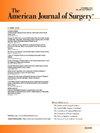The effect of social determinants of health on patient outcomes in acute trauma: A systematic review
IF 2.7
3区 医学
Q1 SURGERY
引用次数: 0
Abstract
Introduction
Social determinants of health (SDoH) may mediate disparities, but their effect on outcomes after trauma is not well known. The purpose of this review is to improve existing gaps of knowledge for a broad range of SDoH and trauma-related outcomes.
Methods
This was a systematic search to identify studies that evaluated the effect of race, insurance status, socioeconomic status (SES), health literacy, and community deprivation on inpatient mortality, morbidity, and post-discharge health care utilization in diverse trauma populations ≥16 years. Data were extracted on study design, patient and injury characteristics, outcomes, and covariates. Qualitative analysis was performed and reported results were stratified by exposure. An overall assessment of the strength of evidence for key clinically relevant comparisons was conducted.
Results
60 studies were included. Overall, race was not meaningfully predictive of mortality or morbidity, with evidence reporting inconsistent or small magnitude of effects. However, African American/Black race was consistently associated with decreased odds of discharge to rehabilitation. Compared to insured patients, uninsured patients may have greater mortality risk and be less likely to discharge to rehabilitation. Studies evaluating health literacy or community deprivation reported conflicting results.
Conclusions
Disparities related to race are most profound for post-discharge health care utilization, while insurance status may be a strong negative predictor of both mortality and discharge disposition. More research is needed on health literacy and community deprivation to better understand mechanisms of disparity after trauma. Interventions targeted at improving continuity of inpatient and outpatient care may be beneficial.
求助全文
约1分钟内获得全文
求助全文
来源期刊
CiteScore
5.00
自引率
6.70%
发文量
570
审稿时长
56 days
期刊介绍:
The American Journal of Surgery® is a peer-reviewed journal designed for the general surgeon who performs abdominal, cancer, vascular, head and neck, breast, colorectal, and other forms of surgery. AJS is the official journal of 7 major surgical societies* and publishes their official papers as well as independently submitted clinical studies, editorials, reviews, brief reports, correspondence and book reviews.

 求助内容:
求助内容: 应助结果提醒方式:
应助结果提醒方式:


